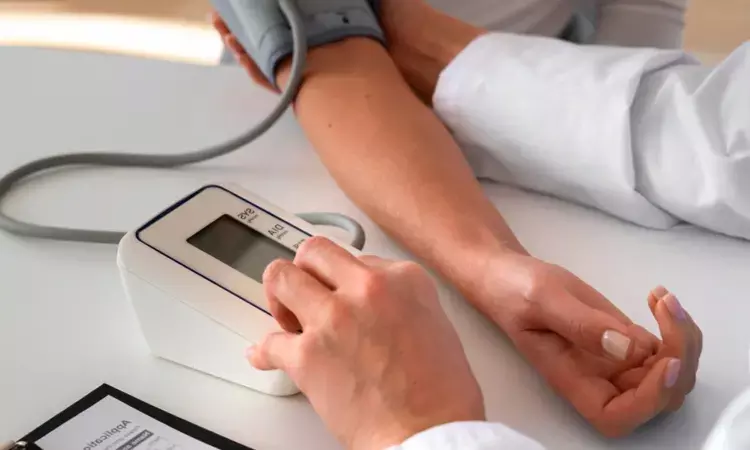- Home
- Medical news & Guidelines
- Anesthesiology
- Cardiology and CTVS
- Critical Care
- Dentistry
- Dermatology
- Diabetes and Endocrinology
- ENT
- Gastroenterology
- Medicine
- Nephrology
- Neurology
- Obstretics-Gynaecology
- Oncology
- Ophthalmology
- Orthopaedics
- Pediatrics-Neonatology
- Psychiatry
- Pulmonology
- Radiology
- Surgery
- Urology
- Laboratory Medicine
- Diet
- Nursing
- Paramedical
- Physiotherapy
- Health news
- Fact Check
- Bone Health Fact Check
- Brain Health Fact Check
- Cancer Related Fact Check
- Child Care Fact Check
- Dental and oral health fact check
- Diabetes and metabolic health fact check
- Diet and Nutrition Fact Check
- Eye and ENT Care Fact Check
- Fitness fact check
- Gut health fact check
- Heart health fact check
- Kidney health fact check
- Medical education fact check
- Men's health fact check
- Respiratory fact check
- Skin and hair care fact check
- Vaccine and Immunization fact check
- Women's health fact check
- AYUSH
- State News
- Andaman and Nicobar Islands
- Andhra Pradesh
- Arunachal Pradesh
- Assam
- Bihar
- Chandigarh
- Chattisgarh
- Dadra and Nagar Haveli
- Daman and Diu
- Delhi
- Goa
- Gujarat
- Haryana
- Himachal Pradesh
- Jammu & Kashmir
- Jharkhand
- Karnataka
- Kerala
- Ladakh
- Lakshadweep
- Madhya Pradesh
- Maharashtra
- Manipur
- Meghalaya
- Mizoram
- Nagaland
- Odisha
- Puducherry
- Punjab
- Rajasthan
- Sikkim
- Tamil Nadu
- Telangana
- Tripura
- Uttar Pradesh
- Uttrakhand
- West Bengal
- Medical Education
- Industry
Winter-induced increase in BP may persist even when hypertension treated rigorously

USA: A recent study published in the Journal of the American Heart Association found significant increases in blood pressure (BP) during winter in patients with hypertension during intensive BP lowering.
"Winter-induced increases in BP were persistent in hypertension patients despite treatment with up to three classes of antihypertensive medications, with about 7% drop in BP control," Robert D. Brook, Wayne State University, Detroit, MI, and colleagues reported.
Previous studies have shown an increase in blood pressure levels during winter (5.6/3.3 mm Hg higher than in summer). Several issues, however, require clarification to better inform clinical practice, including patient characteristics or treatment aspects (eg, specific regimens, tighter BP control, number of drugs) that modify winter‐induced BP elevations.
Compared with observational studies, clinical trial data offer advantages to address these questions. Therefore, Dr Brook and the team aimed to assess the determinants of BP variations within the ACCOMPLISH trial.
They utilized data from the ACCOMPLISH trial to assess the effect of winter-induced BP elevations — defined as changes in BP from December to February compared with June to August — on BP level and rate of control. Control was defined as BP below 140/90 mm Hg.
ACCOMPLISH was a double-blind, randomized trial for which researchers made a comparison of the primary endpoint of the first CV event or CV death among hypertension patients assigned to the ACE inhibitor benazepril plus the calcium channel blocker (CCB) amlodipine or benazepril plus the thiazide-type diuretic hydrochlorothiazide.
The study included 8,150 participants from the ACCOMPLISH trial from 400 sites in the US. In-office BP measurements were taken from each participant at 1, 2, 3, 6 and 12 months and every 6 months and every 6 months thereafter, leading to 79,082 BP readings for the analysis.
The study led to the following findings:
- On average, participants were taking 3.3 antihypertensive medications, with 77.1% being prescribed additional drugs beyond benazepril plus amlodipine or benazepril plus hydrochlorothiazide.
- Between months 6 and 42, the average BP was 129.7/72.3 mm Hg and 88.7% of participants achieved BP control.
- After adjusting for multiple testing, the researchers observed that both systolic and diastolic BP were significantly higher during all other months compared with July. The differences in average BP during July compared with June and August were not significant.
- Rates of BP control were also lower during all other months compared with July, except for August.
- Systolic BP levels were on average 2.6 mm Hg higher during December and control rates were 7.2% lower.
- There were no significant effects by age, sex, race, BMI, treatment intensity, drug regimen or achieved systolic BP on winter-induced BP elevation.
"For the first time, we have shown that BP-raising effects of winter persist among rigorously treated patients in a clinical trial. There was no evidence that the magnitude of winter-induced BP elevations differs by personal characteristics, suggesting that most patients may be at risk, "the researchers wrote.
"Even tight systolic BP control to < 130 mm Hg (current goal) failed to protect patients. ... It has been suggested that scrupulous BP monitoring and up-titration of drug therapy during winter may be a rational management strategy. Our findings support this recommendation," they concluded.
Reference:
The study titled, "Worse Blood Pressure Levels and Control During Nonsummer Months in Rigorously Treated Patients With Hypertension: The ACCOMPLISH Trial," was published in the Journal of the American Heart Association.
DOI: https://www.ahajournals.org/doi/10.1161/JAHA.123.030696
Dr Kamal Kant Kohli-MBBS, DTCD- a chest specialist with more than 30 years of practice and a flair for writing clinical articles, Dr Kamal Kant Kohli joined Medical Dialogues as a Chief Editor of Medical News. Besides writing articles, as an editor, he proofreads and verifies all the medical content published on Medical Dialogues including those coming from journals, studies,medical conferences,guidelines etc. Email: drkohli@medicaldialogues.in. Contact no. 011-43720751


